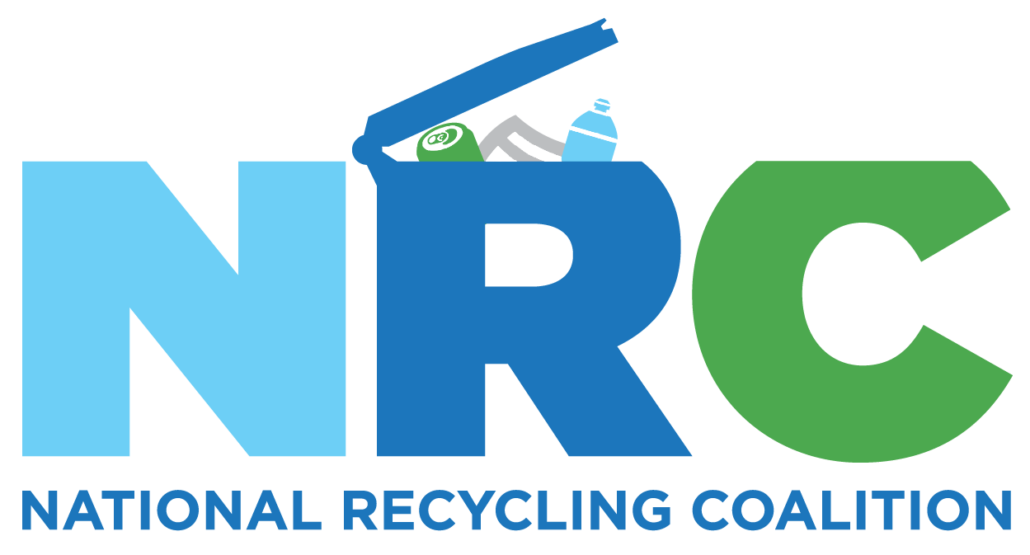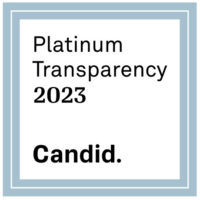The National Recycling Coalition 2017 Awards Recipients
Contacts:
Savannah Betkowski, NRC Staff; (202) 618-2107
Lisa Skumatz, Awards Chair [email protected]; 303/913-4229
This August, The National Recycling Coalition honored their recycling awards recipients at the 2017 Resource Recycling Conference in Minneapolis. The awards were presented to the winners, along with the recipients of the Murray J. Fox Scholarship, at the Conference Welcome Reception hosted by the NRC and the Recycling Association of Minnesota.
The awards program is designed to honor and recognize outstanding individuals, programs, and organizations around the country, both for their achievements, and to serve as a model and a resource for learning for NRC members. Award categories include higher education, not- for and for-profit organizations, business leadership, and recognition of outstanding programs. The NRC will be posting information on all winners on the NRC’s website.
NRC’s Awards Committee Chair Lisa Skumatz commented on the process saying of fellow committee members, “They worked long and hard to sort from among the more than one hundred submittals to find those shining examples – a task that was made particularly hard because there were so many really stellar nominees. We were very pleased that winners came from across the country to accept their awards, so attendees had the chance to learn first-hand how these programs work so well!”
2017 Awards and Recipients
- Outstanding Business Leadership For-Profit Company- Avaya Stadium (San José, CA)
- Outstanding Not-for-profit Business Leadership- Cooperative Teamwork & Recycling Assistance: CTRA (Austin, TX)
- Outstanding Not-for-profit Business Leadership Honorable Mention- Northeast Resource Recovery Association: NRRA
- Outstanding Recycling Organization- the Michigan Recycling Coalition: MRC
- Outstanding Higher Education- the University of Florida
- Outstanding Higher Education Honorable Mention- The University of Illinois at Chicago, Office of Sustainability
- Outstanding Community or Government Program- South Central Solid Waste Authority: SCSWA
- Outstanding Community or Government Program Honorable Mention- Emmet County (MI) Recycling
- Bill Heenan Emerging Leader- Samantha Yager: Recycling Coordinator for the City of Columbia, SC & Tori Carle: City of Greensboro (NC) Recycling Educator at ‘Operation Bed Roll’
- Bill Heenan Emerging Leader Honorable Mention- Matthew O’Carroll: Refuse, Recycling, & Water Efficiency Manager at UC Santa Barbara
- Lifetime Achievement in Recycling- Arthur Boone, CA
Details of the Awards and Winners
Outstanding Business Leadership For-Profit Company: Avaya Stadium
In 2015, the San Jose Earthquakes opened Avaya Stadium, an 18,000 seat, LEED Silver-certified building. The team’s dedication to environmental stewardship goes above and beyond their certification; the team installed an edible garden, offers reusable bags and cups instead of disposables, participates in Earth Day programs, and promotes junk pickup, recycling, proper hazardous waste disposal, and litter reduction messages.
From conception through completion and programming, Avaya Stadium has shown outstanding leadership in its commitment to sustainability. Not only is this a LEED certified building, but during construction, all existing concrete was removed and fully recycled, and 90% of the stadium’s steel is recycled steel content. The 3,500 feet of wood lining the suites, press box, concession stands, and scoreboard bar is recycled 100-year old wood from the historic Hangar One at Moffett Field, just a few miles away from the stadium. The stadium maintains its xeriscaped grounds with reclaimed water using a smart clock sprinkler system and is powered with solar panels installed throughout the parking structure. No waste generated at the stadium goes directly to landfill. All material is sorted and organics, including food waste, are anaerobically digested converting waste to energy. As only the 15th soccer stadium in the MLS, they are a perfect example of business leadership and commitment to the environment.
Outstanding Not-for-profit Business Leadership: Cooperative Teamwork & Recycling Assistance (CTRA)
Texas consists of many rural communities and sparsely populated areas. Because of their size and remote locations, many of these entities are unable to establish cost effective recycling programs. For over 20 years, Cooperative Teamwork & Recycling Assistance (CTRA) has been the only nonprofit cooperative marketing organization in Texas. CTRA currently consists of 52 recycling cooperatives who serve more than 500 entities, 500,000+ Texas citizens, and covers a service area of over 43,000 square miles. The goal of CTRA’s partnerships is to establish, maintain or improve recycling as an economically viable option, for underserved rural communities. CTRA’s membership includes civic groups, private industry, military bases, government entities and school districts. The strength of the cooperative provides the bargaining power needed to negotiate higher commodity prices.
For members, CTRA serves as their liaison between the public and private sector by negotiating contracts with haulers and end markets at competitive prices. The collection, transport and sale of recyclables is coordinated through CTRA and its contractors. CTRA helps community recycling programs to effectively increase the amount and quality of collected recycled materials. CTRA’s impact on recycling efforts in Texas has been substantial. From November 1995 through 2016, CTRA’s members has generated over $9,283,698 in revenue for these communities as well as saved over 396,879 yards of landfill space and $3,931,770 in landfill fees! As an outstanding business leader CRTA continuously promotes new programs and with groups across the nation and in Canada providing advice on establishing recycling cooperatives.
Outstanding Not-for-profit Business Leadership (Honorable Mention): Northeast Resource Recovery Association (NRRA)
One of the first recycling organizations in the country, NRRA has been leading the way in innovation and stewardship since 1981. It has been sought out to see how its model has been able to survive the recycling markets downturns that have resulted in several similar organizations either scaling back or ceasing operations altogether. NRRA has been servicing member towns in Massachusetts, Maine, Vermont, Connecticut and Rhode Island since 1995.
Since 1981 NRRA has adhered to its two-fold mission of “acting as a source of education in the field of solid waste management”, and “as a market development service”. Over 20 years ago NRRA recognized the issues surrounding the recycling of glass as fewer and fewer facilities would accept it for processing, and separation and hauling was a key challenge. NRRA worked to develop, and got approved in NH, the
“certified waste derived product” known as “Processed Glass Aggregate” (PGA). PGA was held out of the waste stream, consolidated at host sites, and crushed with a mobile crusher contracted by NRRA. The material was then used in municipal road beds, under parking lots and sidewalks, and culverts due to its intrinsic resistance to frost.
Since 2007 NRRA has moved over 750,000 tons of material, at the lowest cost or the highest revenues. It has grown to be the “one stop shop” for all things recycling and management of the entire waste stream. In smaller municipalities and towns waste stream management and recycling operations often fall to the DPW head or part time help. It is invaluable to have NRRA as the one reliable source to call.
Outstanding Recycling Organization: Michigan Recycling Coalition
One of the way Michigan Recycling Coalition exemplifies an outstanding recycling organization is the way it serves a broad membership through valuable education and outreach initiatives, connecting recycling professionals across the state through its conference, campaigns, and new regional outreach. To keep its members up to date and provide access to the most relevant information, MRC has developed a marketing campaign designed to raise awareness of and participation in recycling programs across the state; offers a Materials and Recycling Management Training series; promotes Regional Outreach through a Board driven initiative that encourages collaboration by regions; provides weekly newsletters, a recycling directory and has been holding annual conferences for the last 35 years.
The MRC demonstrated true leadership in 2011 with the release of “The State of Recycling in Michigan: A Way Forward”, a report which outlined the need for leadership and investment by the State of Michigan. This year they released the 2017 Report, “The State of Organics Recovery in Michigan: Priorities and Recommendations”. MRC is known for their strong partnerships, solid advocacy voice, and technical knowledge. Because of MRC’s efforts Michigan’s political leaders are taking notice. The attention and growth the industry is seeing is attributable to the hard work and success of the Michigan Recycling Coalition.
Outstanding Higher Education: University of Florida
For nearly three decades, the University of Florida has been a leader in recycling through its research, education and training, and campus operations. The cutting-edge research directed by UF’s Hinkley Center for Solid and Hazardous Waste Management has advanced knowledge leading to better regulation and policy around managing construction and demolition debris, hazardous waste, medical waste, recycling and reuse.
Students in the Engineering School of Sustainable Infrastructure & Environment engage in field and laboratory research related to waste management, landfill design and beneficial use of waste materials. The Training, Research and Education for Environmental Occupations Center offers a number of required training courses for operators of hazardous and solid waste facilities, including MRFs, C&D sorting and transfer stations. The UF Physical Plant Division provides recycling, reuse, and composting services to students, faculty and staff throughout the 2000- acre central campus. UF diverted 56.3% of its waste from landfills in 2016.
Outstanding Higher Education (Honorable Mention): University of Illinois-Chicago, Office of Sustainability
Since 2014, the undergraduate Sustainability Internship Program (SIP) at the University of Illinois at Chicago has combined fine-grained, hands on experience of dealing with “real world” problems with the broader issues of sustainability. Students work one-on- one with a professional mentor/manager at NGOs such as Good Food Festival/Family Farmed, and Chicago Resource Center to address specific issues throughout the semester.
UIC placements include Facilities Management, Dining Services, College of Medicine, Student Centers, Center for Literacy, and the UIC hospital. The seminar includes visits recycling centers and green buildings, as well as focused presentations on resume writing, campus recycling and green laboratories. The semester concludes with a poster presentation where students share their learning with friends, staff, and other mentors. Student work has supported zero-waste event planning, local food procurement, battery and pen recycling program implementation, laboratory glass redistribution and paper reduction. These experiences provide valuable sustainability-related work experiences and professional references.
Outstanding Community or Government Program: South Central Solid Waste Authority (SCSWA)
In 2009 the South Central Solid Waste Authority located in Las Cruces, New Mexico launched one of the state’s first large-scale curbside recycling programs. Since this time, they have set a strong example for recycling excellence in New Mexico. The Authority continues this trend by implementing new programs, adding services, educating residents, focusing on schools and being willing to serve as a leader and role-model in the state.
Accomplishments include a sustainable glass program in a state that has few existing markets for glass. Since April of 2014 their glass program has diverted over 600 tons from the waste stream and created a product that is beneficially used by the community, as well as providing raw materials for a local sand-blasting small business. The Authority has launched a community tire shredding program that diverted over 60,000 lbs. of shredded tires from the waste stream to the Dona Ana County International Jetport for beneficial use on their airfield. Additionally, the Solid Waste Authority hosts over 50 community litter clean ups each year and has expanded their school program to include all 3 school districts in Dona Ana County. They have diverted over 40,400 tons of household recyclables since 2011.
Outstanding Community or Government Program (Honorable Mention): Emmet County Recycling (MI)
Emmet County Recycling is the leading rural recycling program in Michigan. For over 27 years, the program’s guiding principles are to be: Convenient – with recycling collected curbside, residential and commercial and at 13 Drop Sites, Comprehensive – accepting over 60 materials for recycling, yard waste and food waste composting, and Cost effective -their Enterprise Fund and best-practice policies have created a sustainable funding model without county general fund dollars.
Over 80% of Emmet County residents use the recycling services. 42% of Emmet County’s waste is recycled—almost three times the state average of 15%. Operating curbside and drop site trucks, the Material Recovery Facility (MRF), and their education programs provides outstanding communication and service. Leveraging funding for rolling carts tripled curbside capacity to 100 gallons per household / week. Emmet’s MRF also serves three neighboring counties. They demonstrate leadership at the state level, with their director serving on the Governor’s Recycling Council.
Bill Heenan Emerging Leader: Samantha Yager
Samantha Yager began her municipal government service as an intern in 2011 and in the past year, she was promoted to Solid Waste Assistant Superintendent and is now leading recycling education and operations for the City of Columbia. Samantha managed the $2.2 million carts conversion. It was her job to formulate a budget, delivery plan, educational plan, and to oversee the entire project. In the end, she produced a $250,000 budget savings, delivered 34,000 carts in 13 days and recorded a 60 percent increase in recovered materials. Samantha’s efforts extend much further than the curbside program. She has added new recycling cans in Columbia’s hospitality districts and will bring recycling to Columbia’s more than 60 parks. She has put recycling in Columbia’s only professional sports team stadium. She has tripled program results that have been stagnant since 2007. Samantha has a bright future in solid waste and has the work ethic and eagerness to help improve the industry.
Bill Heenan Emerging Leader: Tori Carle
Tori Carle, an avid Pinterest user, discovered the concept of turning unwanted shopping bags into plastic bag yarn – called plarn – that could be crocheted into a blanket-like mat. This craft project turned into a much bigger idea: use the plarn to create bed rolls that could be used as sleeping surfaces for people who sleep outside and need a barrier to keep from losing body heat to the ground. The bed rolls are better than traditional blankets because the plastic is waterproof, easy to clean, and doesn’t attract bugs like cloth. Each bedroll takes upward of 700 plastic bags and 60-100 hours to complete. We called the project Operation Bed Roll: Conserve, Crochet, Care.
Operation Bed Roll aims to teach residents about the non-recyclability of plastic bags in residential recycling containers. To spread this message in a unique way, Recycling Educator Tori Carle designed a workshop to train residents to turn plastic bags into portable sleeping surfaces for the homeless. They are a better alternative to traditional blankets because they are lightweight, easy-to-clean, and do not attract unwanted insects. In 2016, over 3,000 residents participated, 211 bed rolls we created, and an estimated 147,700 plastic bags were kept out of landfills. An additional 60 bed rolls* have been donated in 2017 as the project continues.
Bill Heenan Emerging Leader (Honorable Mention): Matthew O’Carroll
Matthew O’Carroll is responsible managing UCSB’s refuse, recycling, and waste management program, water resources and water efficiency efforts, and the integrated pest management (IPM) program. In this role he has been instrumental in driving sustainability forward on the UCSB campus. Some of his accomplishments include: leading a UCSB campaign to reduce potable water use (a 21% reduction since FY12-13), authoring UCSB’s 2013 Water Action Plan which received a best practice award at the California Higher Education Sustainability Conference (CHESC), increasing UCSB’s waste diversion rate by 14% in three years, receiving over $200k in grant funding for water conservation and efficiency efforts, introducing a campus-wide lab waste management program at UCSB, Co-Chairing the UC System Wide Waste Working Group, and helping UCSB take home a Best Practice Award from CHESC for his work on a project to Optimize Waste Management Services Through Stakeholder Engagement.
Matt has also been involved in the Statewide Zero Waste Plan and Best Practices tool kit. According to Hilary Beckmann, the associate Director of Sustainability at the UC office of the President (UCOP), “Matt has been an integral campus lead informing the development of a UC Statewide waste plan and a web based zero waste best practices tool kit for UC campuses. The tool kit includes reporting standards and methodologies for campus waste and recycling professionals (and affiliated staff).”
At only 28 years old, Matt has definitely emerged as a young leader in his field who is respected and loved by his colleagues.
Lifetime Achievement in Recycling
Mr. Boone is a pioneer and leader in the California recycling scene. Fondly known as ARB or Boone, he has had three careers – Minister, Human Rights Executive and Recycler. At 79, Arthur is semiretired but still writes for technical journals, consults with businesses and public agencies, conducts small project grants and teaches a three-day Introduction to Recycling class for the Northern California Recycling Association (NCRA). A very active NCRA member, he served on the Board of Directors for 30 years. Since “retirement” he has made himself useful to the larger recycling community while pulling together his writings from the last 25 years, to which the website Center for Recycling Research is primarily dedicated.
Arthur is best known today for his 18 years producing and facilitating a one-day conference each spring for NCRA called Recycling Update. In fact it is a very popular innovations conference bringing together 25 speakers limited to ten minute presentations; some call it “speed dating for recyclers.” More than 300 people now attend this program; some of the content is posted on the NCRA website and YouTube. The format has been replicated across the country by other recycling organizations.
Most of his current time is spent in recycling as a volunteer. In the past five years, he has done various small research-related projects. He gets paid to teach two or three times a year, but he has a lot to do. If there were professors of recycling, Arthur might well be one, but there aren’t, so Arthur labors on as a practicing (though untenured) scholar.
Notable supporters and contributors of these awards include: Steel Recycling Institute- Dave Keeling; ISRI – Robin Weiner; Alpine Waste-Brent Hildebrand; EmergeKnowledge/Re-TRAC- Rick Penner; Skumatz Economic Research Associates – Lisa Skumatz; The Recycling Partnership – Dylan De Thomas; Pennsylvania Recycling Markets Center, Inc.-Bob Bylone; CU Boulder-Jack DeBell; Paper Recycling Coalition-Fran McPoland; George Dreckmann- NRC Board Member; Puerto Rico Recycling Coalition – Antonio Rios; Mid-America Recycling-Mick Barry; Key Energy – Gary Bilbro;
The National Recycling Coalition congratulates all of this year’s winners!
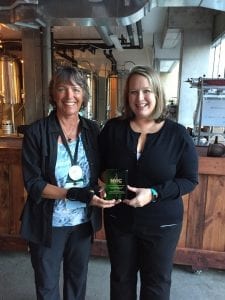 |
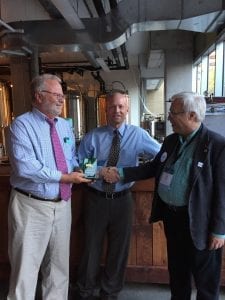 |
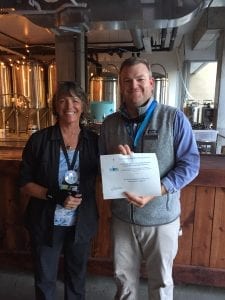 |
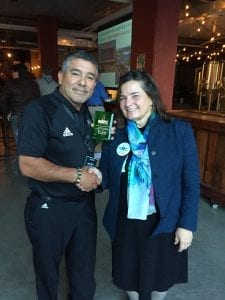 |
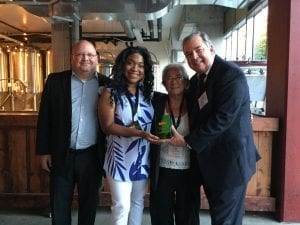 |
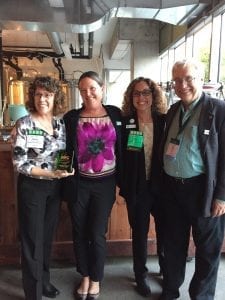 |
About the National Recycling Coalition (NRC):
The National Recycling Coalition is a non-profit organization focused on promoting and enhancing materials management in North America, with a network of more than 6,000 members extending across waste reduction, reuse, composting and recycling. For nearly 40 years, NRC has been a leader in driving education and policy around recycling. Learn more about the NRC at www.NRCRecycles.org
